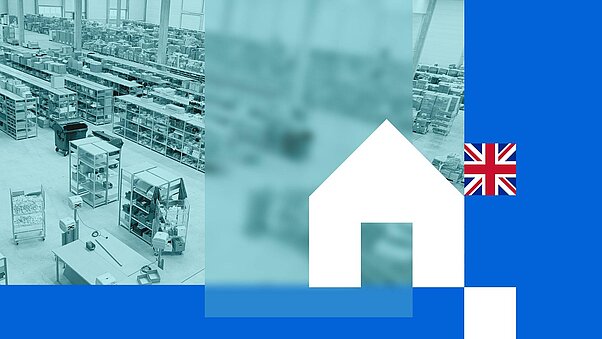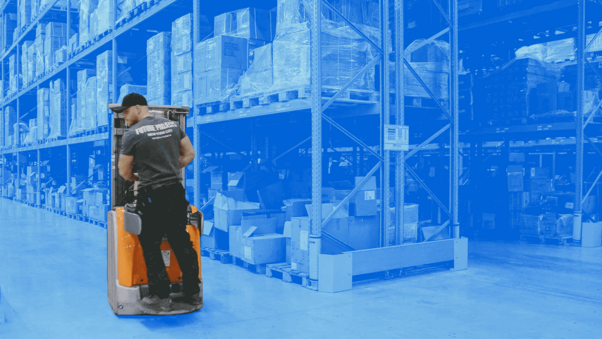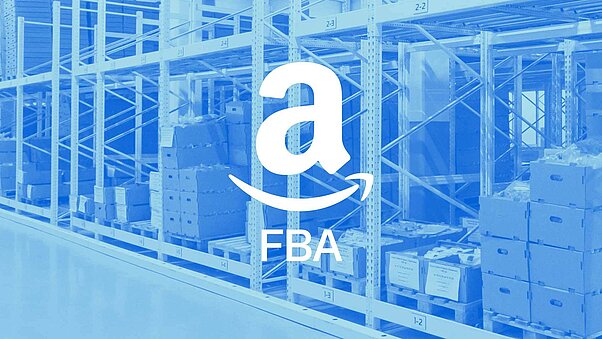Meaning of logistics in the business world - definition and illustrative examples

Logistics is one of the largest industries and the main artery of the global economy. It encompasses many different logistics sub-areas and tasks that enable smooth logistics processes for businesses.
In this article, you will learn in a simple way what logistics actually is, its exact definition and the meaning of logistics in the business world. It will certainly surprise you what is behind it all.
A simple definition: What is logistics?
- By definition, logistics means "replenishment" and refers to the process of supplying someone, a group or a company with everything they need. Logistics describes the planning and control of the flow of goods.
Logistics in an even broader sense also includes the transport of people and information. In this article, however, we describe goods, or commodity logistics, especially for businesses - our special field.
The term "logistics" comes from the ancient Greek and means something like "arithmetic".
No wonder, because it is an incredibly complex task to get all the necessary goods to the right place at the right time. Logistics is the lifeline of the global economy, without which nothing works.Wherever you are - at home, in the office or on the road - take a look around. Everything around you has been manufactured somewhere and delivered on the spot. The chair you sit on, the mobile phone you read on and even the train you ride in. Numerous logistics companies brought the necessary material of these goods to the producer and from there to you via detours.
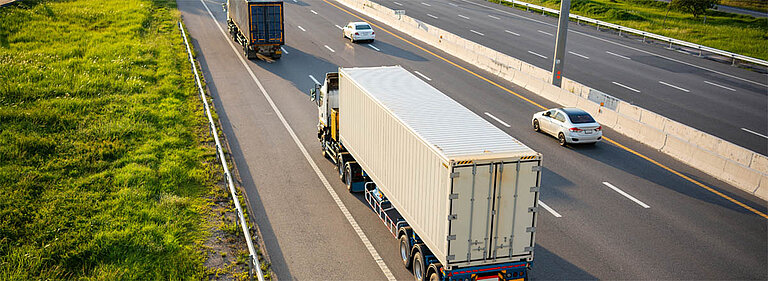
Because without functioning logistics processes:
- Many shelves in the supermarket remain empty because food has to be collected regularly.
- No parcels will arrive from the online shop if there are no items in stock.
- There's no petrol at the pump because the tanker doesn't arrive.
- Products cannot be manufactured because components for them are missing - from laptops or vehicles, to furniture and medicines, to building materials such as bricks and cement.
To prevent all this from happening, logistics processes around the world ensure a constant supply.
Logistics companies: Meaning and differences
As one of the largest industries in the world, logistics employs over 2.5 million people just in the UK alone and generates a turnover of about $500 billion a year!
This enormous number of employees is at work along the entire logistics process, also known as the "supply chain" - you can read more about this below.
These companies are part of logistics:
- Transport companies and freight forwarders that move raw materials and goods primarily over land by truck and air, but also by sea.
Some of the largest freight forwarders in the world are: Kühne + Nagel, DHL, DB Schenker, Panalpina or even Sinotrans.
- Shipping companies, with their huge container ships specialised in transporting goods from overseas.
Well-known shipping companies include MSC, APM-Maersk, COSCO, Hapag-Lloyd and Mediterranean Shipping.
- Shipping service providers that deliver packages from online shops to their customers. Many large shipping services also take on forwarding tasks.
DHL, GLS, UPS, FedEx and Royal Mail are just a few examples.
- Fulfilment providers like Quivo, which handle all logistics for e-commerce shops.
- Warehouses that (temporarily) store goods on a long-term basis. Many warehouses belong to or are rented by the largest freight forwarders and logistics groups:
Deutsche Post DHL, DB Mobility, Maersk, FedEx, UPS and Co.
- Packaging companies that (pre-)package goods in large quantities.
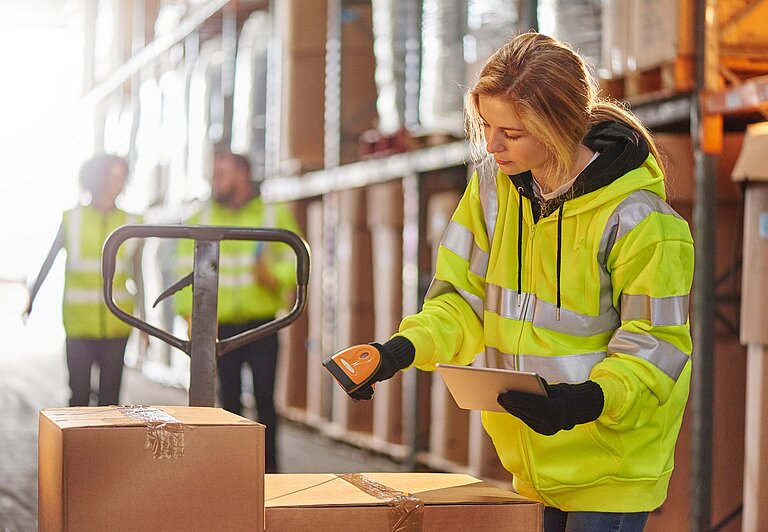
The logistics branches and sub-fields explained
There are a lot of sub-areas in business logistics, all of which ensure that things get from A to B smoothly:
- One of them is procurement logistics: this has to do with making sure that the right parts and materials for production are there when you need them.
Imagine that a company builds smartphones. All the individual parts have to be delivered on time so that the things can be produced. That's the job of procurement logistics.
- Then there's production logistics: it makes sure that everything runs like clockwork in the factories. Here, everything revolves around optimising production processes so that the goods can be produced in the desired quantity and quality.
Production logistics takes care of the smooth flow of materials and the use of machines and labour to make production as efficient as possible. It's about avoiding bottlenecks and coordinating the entire production process in the best possible way.
- But that's not all, because there is also distribution logistics. Their job is to make sure that finished products find their way to their customers.
So when you hold your smart new smartphone in your hands, distribution logistics has done its job well.
- And last but not least, we have the disposal logistics! It may not sound so glamorous, but it is enormously important. Here, everything revolves around what happens when goods are no longer needed. Disposal logistics takes care of the environmentally friendly and proper disposal or recycling of materials and products between each of the different logistics sub-sectors.
- Often forgotten is warehouse logistics, which is becoming more and more of a focus as more and more is ordered: It takes care of the correct storage of goods.
You can imagine it like this: When you order something in an online shop, the things have to be stored somewhere before they are sent to you. Warehouse logistics manages all the chaos and makes sure that everything has its place, is easy to find and that orders are shipped immediately. That's our business - the so-called "fulfilment".
- Finally, there is transport logistics, which is also part of distribution logistics and is used in every intermediate step. This is about how to move goods from one place to another. Whether it's by lorry, train, plane or ship - transport logistics takes care that things arrive safely and as quickly as possible.
We also offer this service for companies with our own transport department!
And voilà, now all sub-fields of logistics are covered! From transport and storage to procurement and distribution to production and disposal - logistics really is a multifaceted and important field that accompanies us in our everyday lives, even if we sometimes don't even notice it.
Of course, none of this works by itself. Many cool technologies are used in logistics, such as GPS, to track and coordinate everything. In addition, numerous people work together in these sub-areas and make the whole thing possible in the first place.
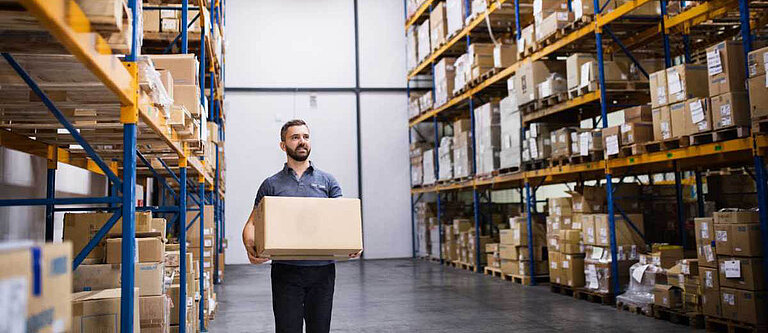
Understanding Logistics Meaning in Business within the UK Context
In the UK, the logistics meaning in business takes on a particularly critical role, given the country's dynamic market environment and its strategic position in global trade. Logistics, in its core essence, involves the efficient management of the supply chain, a process integral to the success of businesses across the UK.
This management encompasses the
- transportation,
- warehousing, and
- distribution of goods,
tailored to the unique demands of the UK market.
Specifically, logistics meaning in business in the UK context is about adapting to the fast-paced, consumer-driven market, ensuring that products from various industries, be it technology, fashion, or food, are delivered timely and efficiently.
The UK, with its extensive network of ports and its status as a trading hub, particularly post-Brexit, relies heavily on proficient logistics to maintain its economic stability and growth. In this landscape, the logistics meaning in business transcends mere movement of goods; it represents a critical lifeline that supports the flow of commerce and trade, both domestically and internationally.
This comprehensive understanding of logistics meaning in business is vital for any entity looking to thrive in the competitive UK market, where efficiency, speed, and reliability are not just valued but expected in every aspect of the supply chain.
What are supply chains?
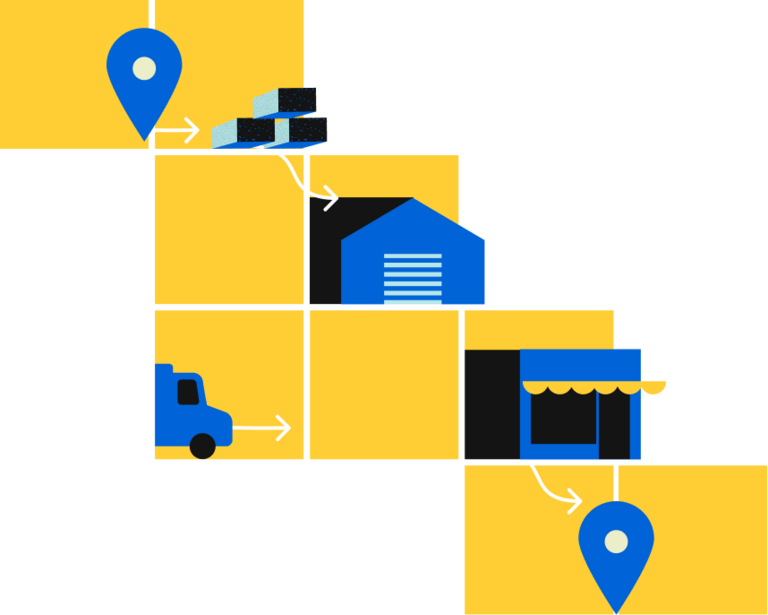
A supply chain is an interlocking transport network that ensures a constant flow of goods.
It consists of various stations, which are:
- Procurement (of raw materials and goods)
- Supply (to the producer)
- Production (manufacturer)
- Distribution (warehousing, forwarding agencies)
- Traders (stationary shops and online shops)
- Customers (shipping services)
- Disposal & recycling (logistics companies)
What means "just in time"?
The very precise, ongoing coordination of each intermediate step in a supply chain is enormously important in order to use resources wisely and work economically.
This system is called "just in time" - just in time: so much is always delivered when it is needed. Efficiency is a top priority here and care is taken not to overload any intermediate station.
So that manufacturers have enough material available to process in a certain quantity or the shops are supplied with the right amount of products without, for example, having to dispose of too much perishable goods unsold.
A practical example: the smartphone supply chain
You urgently need a new mobile phone and are looking for the latest craze on the Internet. Et voilà - you find what you are looking for on a well-known Internet portal; your desired model is still in stock 4 times. One click and you've ordered it!
But what was necessary to make it work? This is roughly what the supply chain looks like - with numerous logisticians who make sure that nothing stands still:
- Transport companies or forwarding agents regularly bring agreed quantities of material from raw material manufacturers to various mobile phone parts producers.
These supplier companies transport finished mobile phone parts at precisely regulated intervals either to other supplier companies or directly to the factory of the major mobile phone brand.
The smartphone company expects a constant flow of very specific quantities of mobile phone parts so that production does not come to a standstill - which can lead to great losses of time and money.
Retailers around the world contract with smartphone companies and expect them to deliver their goods at precise times. If the vendors' "shelves" are not sufficiently stocked, their sales suffer and they potentially lose many customers.
To this end, large quantities of goods - mostly from Asia - are often shipped to the warehouses of sellers, online shops or fulfilment providers like LOGSTA, worldwide:
- This is where you come in and order your new smartphone.
- Your order arrives at the responsible logistics company in the fulfilment warehouse, where your phone is immediately packed and handed over to shipping service providers such as the post office.
- The shipping service finally brings the smartphone to your doorstep.
- What happens to your old, broken mobile phone? Of course, you don't throw something so valuable into the residual waste, but take it to a recycling centre where old mobile phones can be collected and partially recycled.
- Here, too, logisticians ultimately come into play who take care of the transport to the recycling or disposal sites.

If you have any questions about logistics or need support with your logistics, we're happy to help!
Just write to us! We'll take care of it.
Sources
- These are the largest transport companies in the world
www.capital.de
- Statistics and market volume of the logistics market - Statista
en.statista.com
- BASICS OF LOGISTICS: NOT MUCH WORKS WITHOUT IT
www.oncampus.de/blog/
- Logistics and ports - the foundation of German prosperity
www.wfb-bremen.de
Image sources:
LOGSTA / Quivo © 2024
Canva




